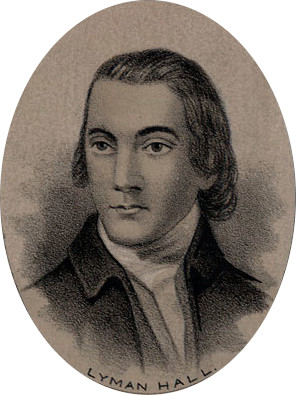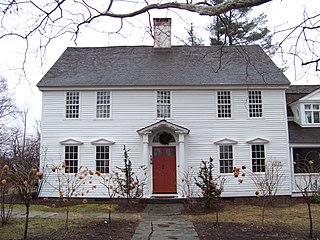Related Research Articles

Oliver Wolcott Sr. was an American Founding Father and politician. He was a signer of the United States Declaration of Independence and the Articles of Confederation as a representative of Connecticut, and the nineteenth governor of Connecticut. Wolcott was a major general for the Connecticut militia in the Revolutionary War serving under George Washington.

Lyman Hall was an American Founding Father, physician, clergyman, and statesman who signed the United States Declaration of Independence as a representative of Georgia. Hall County is named after him. He was one of four physicians to sign the Declaration, along with Benjamin Rush, Josiah Bartlett, and Matthew Thornton.

Jonathan Trumbull Sr. was an American politician and statesman who served as Governor of Connecticut during the American Revolution. Trumbull and Nicholas Cooke of Rhode Island were the only men to serve as governor of both a British colony and an American state, and he was the only governor to take up the Patriot cause at the start of the Revolutionary War. Trumbull College at Yale University, the town of Trumbull, Connecticut, Trumbull County, Ohio, and Jonathan the Husky are all named for him.
Wolcott may refer to:

Robert Treat was a New England Puritan colonial leader, militia officer and governor of the Connecticut Colony between 1683 and 1698. In 1666 he helped found Newark, New Jersey.

The Connecticut Colony or Colony of Connecticut, originally known as the Connecticut River Colony or simply the River Colony, was an English colony in New England which later became Connecticut. It was organized on March 3, 1636 as a settlement for a Puritan congregation, and the English permanently gained control of the region in 1637 after struggles with the Dutch. The colony was later the scene of a bloody war between the colonists and Pequot Indians known as the Pequot War. Connecticut Colony played a significant role in the establishment of self-government in the New World with its refusal to surrender local authority to the Dominion of New England, an event known as the Charter Oak incident which occurred at Jeremy Adams' inn and tavern.

Roger Ludlow (1590–1664) was an English lawyer, magistrate, military officer, and colonist. He was active in the founding of the Colony of Connecticut, and helped draft laws for it and the nearby Massachusetts Bay Colony. Under his and John Mason's direction, Boston's first fortification, later known as Castle William and then Fort Independence was built on Castle Island in Boston harbor. Frequently at odds with his peers, he eventually also founded Fairfield and Norwalk before leaving New England entirely.
Rebecca Minot Prescott (1742–1813) was the second wife of United States Founding Father Roger Sherman.

Roger Wolcott was an American weaver, statesman, and politician from Windsor, Connecticut. He served as colonial governor of Connecticut from 1751 to 1754.
Roger Griswold was a nineteenth-century lawyer, politician and judge from Connecticut. He served as a member of the United States House of Representatives, judge of the Connecticut Supreme Court and the 22nd governor of Connecticut, serving as a Federalist.
Richard Treat was an early settler in New England and a patentee of the Royal Charter of Connecticut, 1662.
John Webster was an early colonial settler of New England, serving one term as governor of the Colony of Connecticut in 1656.

The Oliver Wolcott House is a historic colonial home at South Street near Wolcott Avenue in Litchfield, Connecticut. It was built in 1753 by Founding Father Oliver Wolcott Sr., a signer of the Declaration of Independence and the Articles of Confederation, and a state militia leader in the American Revolutionary War. It is the oldest house in the borough. It was the home of Oliver Wolcott Sr. (1726–1797), and is where his son Oliver Wolcott Jr., was born. Many distinguished guests visited the Wolcott House, including Lafayette and George Washington, who stayed there in 1780 during his first visit to Litchfield. The house was declared a National Historic Landmark in 1971. It is located on South Street, nearly opposite to Wolcott Avenue. The house is not open to the public.
Captain Robert Benham, was a frontier pioneer, served in local government and was a member of the first elected legislature for the State in Ohio, 1799 & 1800.
Charles Johnson McCurdy was an American lawyer, diplomat, and the 40th Lieutenant Governor of Connecticut from 1847 to 1849.

Oliver Wolcott Jr. was an American politician and judge. He was the second United States Secretary of the Treasury, a judge of the United States Circuit Court for the Second Circuit, and the 24th Governor of Connecticut. His adult life began with working in Connecticut, followed by participating in the U.S. federal government in the Department of Treasury, before returning to Connecticut, where he spent his life before his death. Throughout his time in politics, Wolcott's political views shifted from Federalist, to Toleration, and finally Jacksonian. Oliver Wolcott Jr. is the son to Oliver Wolcott Sr., part of the Griswold-Wolcott family.
Martha Wadsworth Brewster was an 18th-century American poet and writer. She is one of only four colonial women who published volumes of their verse before the American Revolution and was the first American-born woman to publish under her own name.

Oliver Ellsworth was a Founding Father of the United States, attorney, jurist, politician, and diplomat. Ellsworth was a framer of the United States Constitution, United States senator from Connecticut, and the third chief justice of the United States. Additionally, he received 11 electoral votes in the 1796 presidential election.
William Pitkin was a colonial governor of the Connecticut Colony.
Erastus Wolcott was an American politician and a Connecticut state militia commander during the American Revolutionary War. He served in the Connecticut General Assembly for over twenty years and was a justice of the Connecticut Supreme Court from 1789 to 1792.
References
- ↑ Walton, Emma Lee (1913). The Clark Genealogy. New York: Frank Allaben Genealogical Company.
- ↑ Walton, Emma Lee (1913). Clark Genealogy. New York: Frank Allaben Genealogical Company. pp. 17–18.
- ↑ Davis, Charles Henry Stanley. History of Wallingford, Conn: From Its Settlement in 1670 to the Present Time, Including Meriden, which was One of Its Parishes Until 1806, and Cheshire, which was Incorporated in 1780, Volume 1. 1870, pages 412-413.
- ↑ Entertaining the Devil in Connecticut Retrieved December 26, 2017